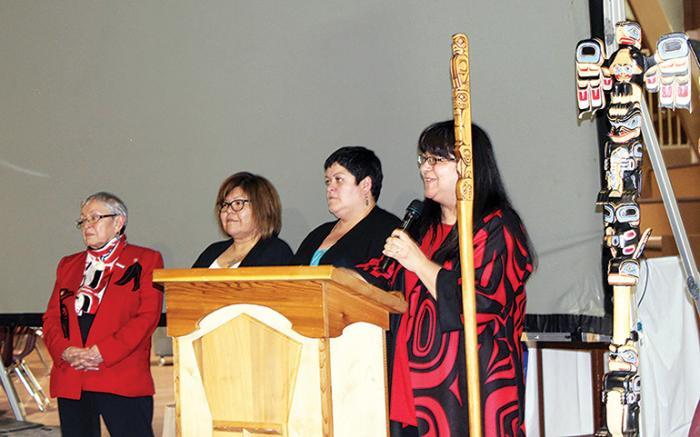
After nine months of intense pressure from HEU members, the Heiltsuk Tribal Council and Heiltsuk band members, the Vancouver Coastal Health Authority (VCHA) recently rescinded displacement notices to care aides working at R.W. Large Memorial Hospital in Bella Bella.
“I’m grateful we didn’t lose our positions,” said Vivian Dixon, a care aide in Bella Bella for more than 30 years. “It was a great job all the way around with good teamwork to help achieve this victory. Our residents are very happy and relieved that we are still going to be there to take care of them.”
Last May, VCHA issued a Section 54 notice to the union, announcing its decision to redesign the care delivery model at the hospital. They cited “safety concerns, staffing shortages, high turnover of staff, lack of clinical support for RNs, and budget constraints.”
The union successfully refuted each of those arguments.
“These care aides live in the community, share the Heiltsuk history, culture and language, and hold family-supporting jobs that are an important part of Bella Bella’s economy,” says HEU secretary-business manager Jennifer Whiteside. “They collectively represent more than 70 years of experience providing culturally appropriate care to the people in their community, including frail seniors.”
Besides losing her job, Dixon feared the quality of care in her community would suffer. “For myself, I was really concerned for our long-term care patients.
“We are like family. We all know each other. It’s important to them to see familiar faces, and have someone like me, who has been there all these years, who is familiar with the health of each resident and can deliver good care.”
A major issue was the health authority’s failure to consult with the Heiltsuk Tribal Council on how this move would impact the Nation’s traditional, holistic health care delivery on their own land, or its effect on band members who rely on familiar care services specific to their unique culture.
“We know the culture and how to deal with things as opposed to somebody coming in off the streets – more or less – for two weeks at a time,” said Dixon. “We know the families and their wishes. We provide beginning to end-of-life care, including palliative care, and we know what to do culturally.”
Vancouver Coastal’s proposal would replace HEU Heiltsuk care aides with LPNs brought into the remote community from nursing agencies or other health authorities.
The Heiltsuk Nation took the VCHA to task, citing sections from Canada’s Truth and Reconciliation Report and the United Nations’ Declaration on the Rights of Indigenous Peoples (UNDRIP), signed by Canada, as proof the band’s human rights were being violated, which is grounds for legal recourse.
And both the Heiltsuk Health Centre Society’s board of directors and the First Nations Health Authority threw their support behind the care aides.
“This victory is the direct result of the respectful collaboration between the Heiltsuk Nation, the care aides, the union and community supporters,” says Whiteside. “Together, our voices were heard.”
“It was a long nine months of uncertainty, like a dark cloud hanging over our heads,” says Dixon. “But now, we can move forward and do our jobs providing care in our community.”
by Brenda Whitehall